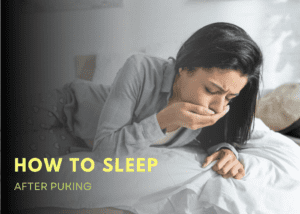Our bodies function properly when we get enough sleep, but not all sleep is created equal. Deep sleep is the most restorative kind and plays an important role in good health.
It helps our brains recharge and rejuvenates our bodies, improving cognitive performance and boosting moods.
Sleeping more deeply can improve overall wellbeing dramatically. The benefits of deep sleep are undeniable, ranging from improved mood to better concentration.
Here’s how to get more of it.
Understand The Benefits Of Deep Sleep

Slipping into deep sleep is like a warm hug, enveloping your body and mind in the bliss of restorative comfort.
In order to reap its many benefits, it’s important to understand how to get more of this essential part of our lives.
For starters, there’s no one-size-fits-all approach.
It might take some trial and error to see what works best for you. That said, there are a few steps you can take right away to get deeper sleep.
Create a consistent bedtime routine that works with your lifestyle. This will help your body recognize the time when it should be winding down for sleep.
Aim for 7-9 hours of snooze time each night, and try your best to stick to regular wake times as well. A comfortable environment is also key—keep your bedroom cool and dark with minimal noise interference.
Lastly, relax before bed by taking a warm bath or meditating — this can really help you drift off more easily into deeper sleep cycles.
Avoid Caffeine And Other Stimulants

Stimulants, like caffeine, are a thief of restful sleep.
Avoiding them is like dodging a bullet; it can be the difference between getting a good night’s sleep and tossing and turning all night long.
Here are some tips to avoid stimulants:
- Food & Drinks: Avoid tea, coffee, caffeinated sodas, energy drinks, chocolate and other high-sugar snacks late in the day.
- Medications: Check for stimulants in any medication you’re taking. Talk to your doctor if you have concerns about the dosage or ingredients.
- Supplements: Be cautious when taking supplements that contain stimulants such as guarana or yerba mate that may disrupt your sleep.
The effect of avoiding stimulants can be profound.
You’ll be able to enjoy more restful sleep and feel energized during the day instead of jittery and exhausted.
The quality of your sleep will improve drastically without these substances stealing away your precious rest time.
Exercising regularly also helps ensure deep sleep – an activity which should be part of everyone’s daily routine.
Exercise Regularly
John is a dedicated professional who wants to get the best out of his day. But despite his rigorous schedule, he finds himself feeling exhausted and unable to focus during the day.
To solve this problem, John decided to look into how he can get more deep sleep.
Exercise regularly is one way to help increase deep sleep.
Regular exercise has been known to induce relaxation in the body which helps prepare it for a good night’s rest.
Here are some ways that John can incorporate exercise into his daily routine:
Cardiovascular exercises:
- Going for a light jog or brisk walk
- Swimming laps at the local pool
- Doing an aerobics class at home or at the gym
Strength training exercises:
- Lifting dumbbells or barbells at home or at the gym
- Doing bodyweight exercises like planks, push ups, and squats
- Taking part in a yoga class
Flexibility exercises:
- Stretching after each workout session
- Practicing Pilates or tai chi
John should aim for 30 minutes to an hour of exercise each day.
This will not only help him get better sleep but also make him feel energized throughout the day.
Establish A Consistent Sleep Schedule
Getting enough deep sleep is essential for a healthy lifestyle. Establishing a consistent sleep schedule is key to achieving this goal.
Significantly, it can be difficult to create and stick to a routine. Yet with dedication and effort, it’s possible. There are two ways to help:
Adjust your environment:
- Make sure your bedroom is comfortable, dark, and quiet
- Set the temperature of your room in the range of 60-67°F
Change your habits:
- Avoid caffeine after lunchtime
- Put away screens at least an hour before bed
- Go to bed at the same time every night
These measures will help you create a consistent sleep cycle that encourages better sleep quality.
Habitual behavior leads to more restful slumber, improving overall wellbeing.
With regular practice, you’ll soon find yourself waking up feeling rested and refreshed.
Practice Relaxation Techniques

Slipping into slumber is a skill, and relaxation techniques can make it easier to get more deep sleep. Taking time to practice relaxation tactics can be a powerful way to promote good rest.
From stretching and yoga to guided meditation and mindfulness, there are numerous paths to peacefulness.
Starting with stretches can set the scene for restful nights.
Gentle movements create an atmosphere of calm, allowing the body and mind to relax and ease the tension that builds up during the day.
Following this up with a few minutes of yoga helps further loosen muscles, reducing tightness in the back, neck and shoulders.
Mindfulness is another tool in the arsenal for improving sleep quality.
By focusing on the present moment—noting any thoughts or sensations without judgment—it’s possible to move away from stress-inducing worries about tomorrow or regrets from yesterday.
Guided meditations are also available as a helpful companion on the path towards relaxation before bedtime.
Releasing stress through these techniques not only makes it easier to drift off but can also contribute to more restful slumber; so take some time out each night for self-care and discover how much better you’ll feel after getting enough deep sleep.
Reduce Stress Levels
Sleep is essential to our overall health, and getting enough deep sleep is a key part of that.
To make sure we get the rest we need, it’s important to make sure our sleeping environment is comfortable and that we’re reducing stress levels.
Keeping these two things in check can help us reach dreamland more effectively.
One way to reduce stress levels is to practice relaxation techniques.
Taking the time to focus on breathing exercises or mindfulness meditation can have a big impact on how much we’re able to unwind at night.
This isn’t always easy – life can be chaotic and overwhelming – but taking the time for yourself is worth it in the long run.
It’s like killing two birds with one stone – you’ll get better sleep and feel calmer during the day too.
It may also be helpful to look at what triggers your stress in the first place so you can try to eliminate them or find ways of coping with them better.
This could mean minimizing screen time before bed, creating boundaries with work, saying no more often, or simply spending some time doing something you enjoy every day.
Allowing yourself a sense of control over your life will go a long way when it comes to reducing stress levels and getting deeper sleep.
Making small changes like these will create an environment where better sleep is possible; even if it takes some time for these adjustments to show their full effect on your sleep quality, they’re still worth making for your overall wellbeing In this way, you’ll be able create a comfortable sleeping environment that supports deep relaxation and restful nights ahead.
Create A Comfortable Sleeping Environment
Creating a comfortable sleeping environment is essential for achieving deep sleep.
Take time to make sure the room is dark, quiet, and at a comfortable temperature.
Blankets, pillows, and a mattress should be supportive and comfortable for your body. Consider using blackout curtains to block out any light.
If noise is an issue, consider using earplugs or a white noise machine to drown out disruptive sounds from outside or other parts of the house.
If needed, use air conditioning or a fan to keep the room at an ideal temperature for sleep.
These small changes can go a long way in helping you get more restful sleep each night.
Take Supplements
Many people struggle to get the deep sleep they need, leaving them feeling tired and unrested.
While a comfortable sleeping environment is one way to help, taking supplements can be beneficial as well.
Supplements are designed to provide the body with any necessary vitamins and minerals that may be lacking in the diet.
For example, magnesium plays an important role in restful sleep and can be found in supplement form.
Taking a magnesium supplement before bed has been shown to improve sleep quality and reduce stress levels.
In addition, a combination of melatonin, GABA and 5-HTP can also help promote deep sleep.
Melatonin helps regulate the body’s internal clock while GABA helps relax the mind and decrease mental chatter.
5-HTP can also increase serotonin levels which helps produce more melatonin for better sleep.
These supplements, taken together or separately, can provide a natural solution to getting more deep restful sleep without relying on medications or other treatments.
With their help, many people have found that they are able to achieve deeper sleep and wake up feeling refreshed each morning.
Limit Screen Time
Research shows that the average American spends upwards of 11 hours per day looking at screens.
This is why limiting screen time is an important step in getting more deep sleep.
Begin by setting a cutoff time for when all screens are turned off and put away each night.
Doing this will send your brain the message that it’s time to start winding down, preparing your body and mind for restful sleep.
Additionally, avoid looking at screens an hour before bed as the blue light from these devices can cause disruption to your natural circadian rhythm.
Create a nighttime routine that does not involve screens or technology and focus on relaxing activities like reading, meditating, or listening to calming music instead.
These activities will help reduce stress levels and allow you to drift off into a deeper slumber.
Making small changes in your daily routine can be highly beneficial for overall health and wellbeing; taking the necessary steps towards creating healthy sleep habits is one way of ensuring sound rest each night.
Eat Healthy Foods Before Bed
Eating healthy foods before bed can have a positive impact on your sleep.
Unhealthy snacks or heavy meals can cause discomfort and indigestion, making it difficult to fall asleep.
Nourishing alternatives like whole grain toast, yogurt with fruit, and a warm cup of tea, can help you relax and drift off quickly.
Making sure your body is properly fueled for restful sleep should be part of your routine:
- Eat an hour or two before bedtime: Have a light snack like cucumber slices or carrot sticks – Choose complex carbohydrates such as oatmeal – Enjoy a cup of herbal tea
- Avoid certain foods: Caffeinated beverages like coffee and energy drinks – Alcoholic beverages which can disrupt the sleep cycle – Spicy food which can lead to heartburn and indigestion
- Consume beneficial nutrients: Foods rich in magnesium such as nuts and legumes – Magnesium helps calm the nervous system, reducing stress levels before bedtime – Healthy sources of protein like eggs, fish, or tofu which promote deep sleep
By developing healthy eating habits prior to bedtime, you may experience improved quality of sleep.
Eating nutritious foods will provide the body with essential vitamins and minerals needed for good health.
This in turn will optimize your ability to get more deep sleep each night.

Frequently Asked Questions
How Much Deep Sleep Should I Be Getting Each Night?
Deep sleep is essential for our bodies to reset and recover.
How much of it should we be getting each night? That depends on the individual, but research has shown that most adults need between 7-9 hours of deep sleep a night.
We all have different needs – some may need more, others less. Age also plays an important factor in determining how much deep sleep you should aim for.
The elderly tend to require less deep sleep than younger generations, while adolescents need more than their adult counterparts. Making sure you get enough restful sleep is key to keeping your body healthy and your mind sharp.
Regular bedtime routines, such as avoiding screens and exercising during the day, can help you achieve the amount of deep sleep needed each night.
Taking steps to reduce stress levels and maintain a consistent sleep schedule can also go a long way towards improving the quality of your nightly rest.
Establishing healthy habits will ensure that you are getting the right amount of deep sleep each night, allowing you to function at your best during the day.
Are There Any Medical Treatments That Can Help Me Sleep Better?
It is a well-known theory that getting more deep sleep can be beneficial to the overall health of an individual. But, how can one get more deep sleep? Are there any medical treatments that can help?
Here are four ways to improve deep sleep through medical treatments:
1. Cognitive Behavioral Therapy (CBT): CBT helps individuals identify and change negative thinking patterns that are causing insomnia and other sleeping problems.
2. Sleep Medications: Some medications may be prescribed to help people fall asleep faster or stay asleep longer.
3. Melatonin Supplements: Melatonin is a hormone produced by the body that helps regulate sleep cycles. Taking melatonin supplements can help induce deeper, more restful sleep.
4. Relaxation Techniques: Stress can interfere with the quality of sleep, so relaxation techniques like meditation, yoga, and deep breathing exercises can help reduce stress levels and promote better quality of sleep.
These treatments can be beneficial for those struggling to get the necessary amount of deep sleep each night.
It’s important to speak with a healthcare provider if you’re having difficulty sleeping as they may prescribe medications or recommend additional therapies that could help improve your quality of rest.
Knowing what works best for you will take some experimentation but when you find something that works, you’ll enjoy much better restorative nights of slumber!
Are There Any Specific Exercises That Help Promote Deep Sleep?
The night – a mysterious and silent affair, as if it was whispering secrets to all of us. It was the time when we could finally rest and go into a deep slumber. Yet, some of us struggle with getting enough deep sleep.
Are there any specific exercises that help promote deep sleep?
Like an old wise man said, sometimes the answer to our questions are right in front of us. There are many exercises that can help promote deep sleep, such as stretching before bedtime or yoga nidra.
Stretching helps relax your muscles, which then allows for deeper relaxation when going to bed. Yoga nidra is an ancient practice of conscious relaxation that promotes deeper relaxation and helps reduce stress levels.
Additionally, taking a warm bath before bedtime can also be beneficial in promoting deep sleep. The warmth from the water will relax your body even further and create a calming effect on your mind as well.
Lastly, having a set routine before bed can also help you get more deep sleep; this could include dimming lights an hour before bedtime or reading a book instead of using screens late at night.
These simple exercises can get you on the path to achieving better quality sleep and allow you to reap the benefits of deep restful slumber each night. So take those first steps towards getting the restful sleep you deserve!
Are There Any Natural Remedies Or Herbs To Help Me Sleep Better?
Just as the sun was setting, I found myself struggling to fall asleep. I had tried every trick in the book but nothing seemed to work. I wondered if there were any natural remedies or herbs that could help me get a better night’s sleep.
I began my research, and soon discovered that there are many herbs and natural remedies available for those looking to improve their sleep quality. Valerian root and chamomile tea are two popular options for inducing deep sleep.
Taking magnesium supplements before bed can also help you relax, as can aromatherapy with essential oils like lavender or cedarwood. Other remedies include exercising during the day, limiting screen time near bedtime, and drinking warm milk before going to bed.
These natural remedies have been proven effective in helping people achieve deeper levels of sleep and relaxation:
Herbs & Natural Remedies:
1. Valerian root
2. Chamomile tea
3. Magnesium supplements
4. Aromatherapy (lavender, cedarwood)
Lifestyle Tips:
1. Exercise during the day
2. Reduce screen time at night
3. Drink warm milk before bedtime
Through trial and error, I eventually found a combination of these remedies that worked best for me – taking magnesium supplements before bedtime, exercising regularly during the day, avoiding screens at least an hour before going to bed – which has ultimately improved my overall quality of sleep.
Is It Okay To Take A Nap During The Day If I’m Having Trouble Sleeping At Night?
Getting adequate sleep is essential for one’s overall health and wellbeing. Taking a nap during the day can be beneficial, especially if having difficulty sleeping at night.
While napping may help to restore energy levels and boost alertness, it is important to consider the potential effects it can have on nighttime rest before engaging in this practice.
The amount of time spent napping will vary from person to person, as well as the type of nap taken.
For those who are struggling to get enough shut-eye at night, a short power nap of about 20 minutes could be beneficial.
It should be noted, however, that taking longer naps could disrupt one’s natural sleep-wake cycle and lead to more difficulty falling asleep at night.
Therefore, while taking a nap during the day may offer some temporary relief from daytime fatigue or struggles with insomnia, it is important to take into account how it may affect your overall quality of sleep in order to ensure you are getting the restful repose you need.





